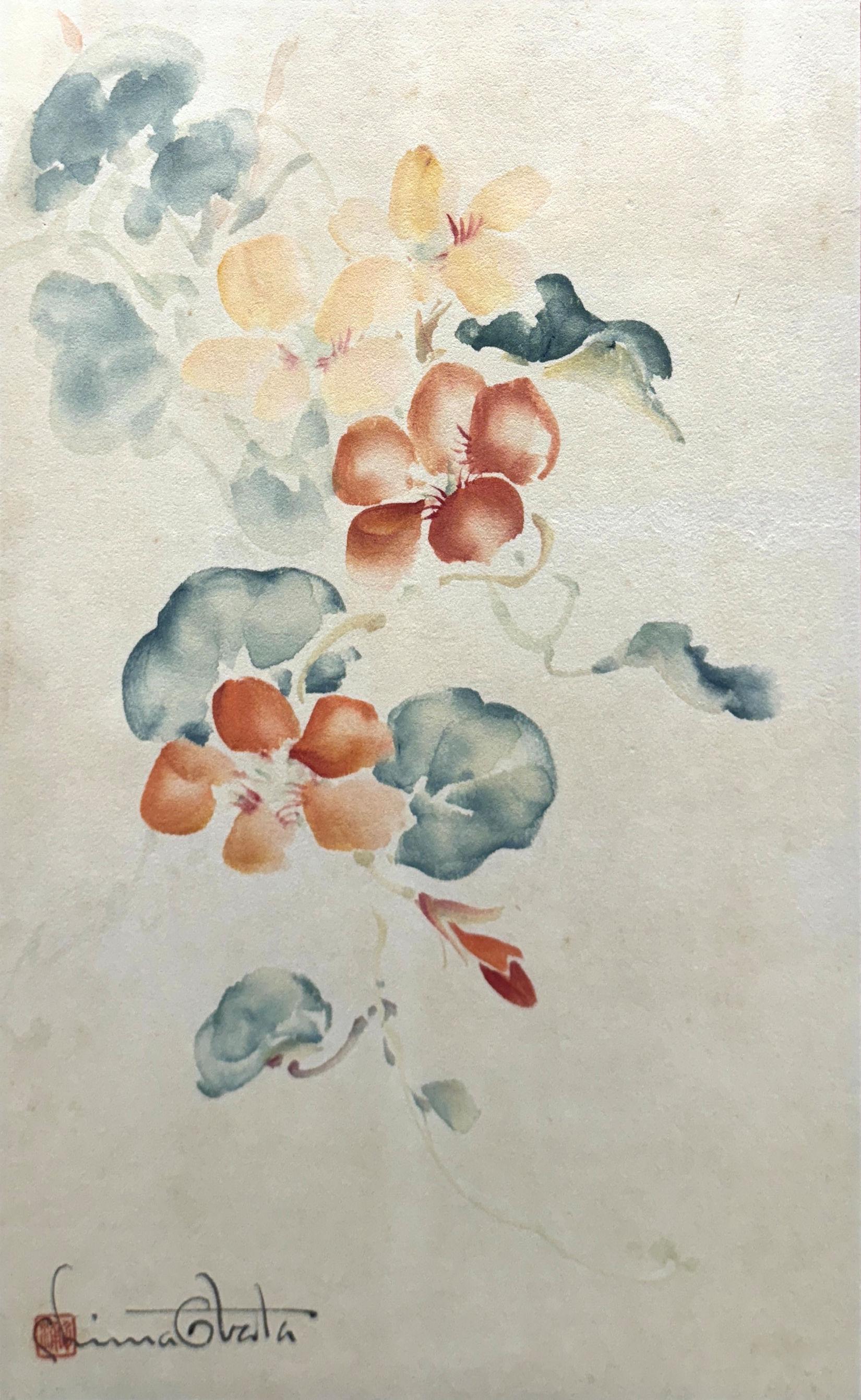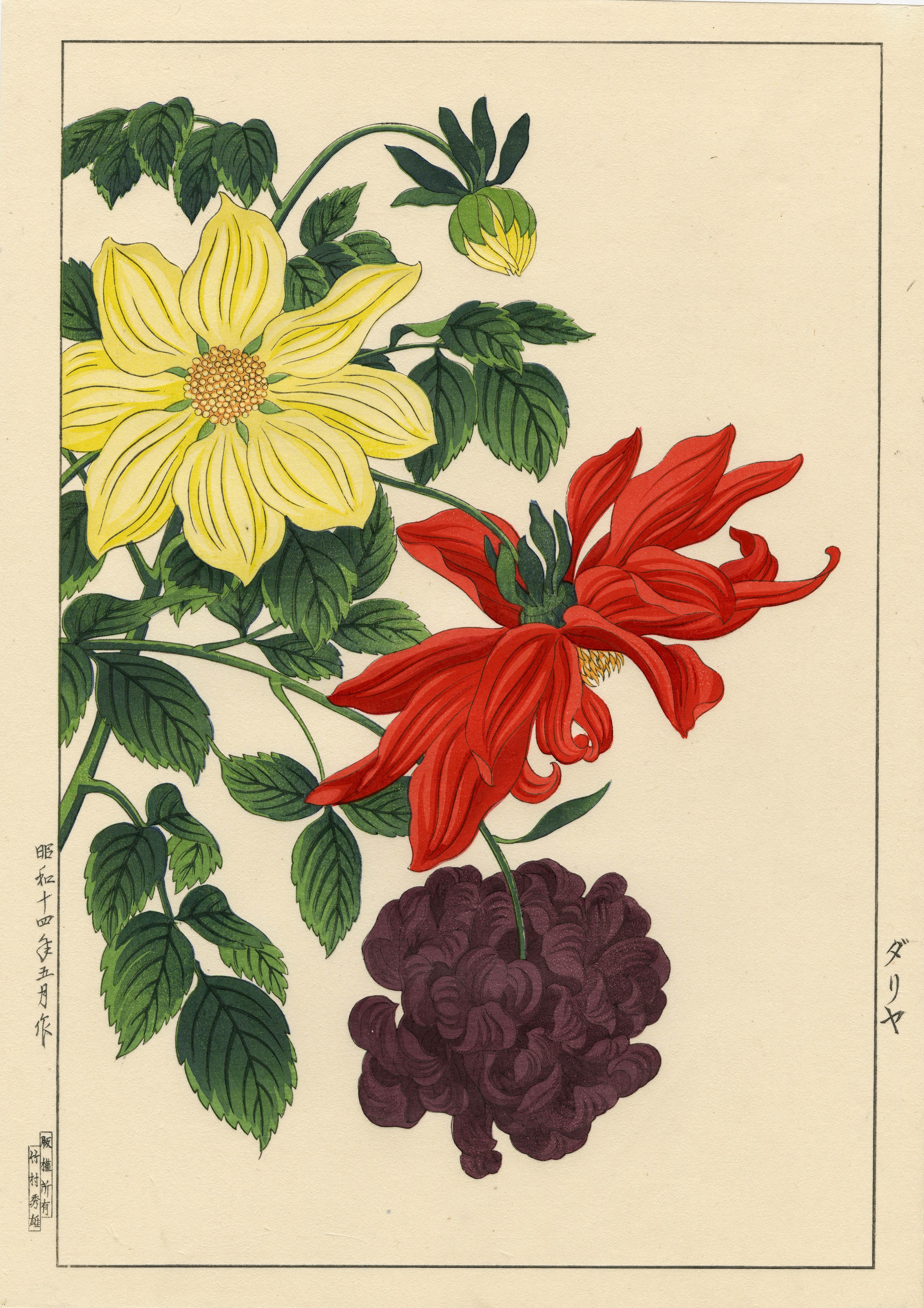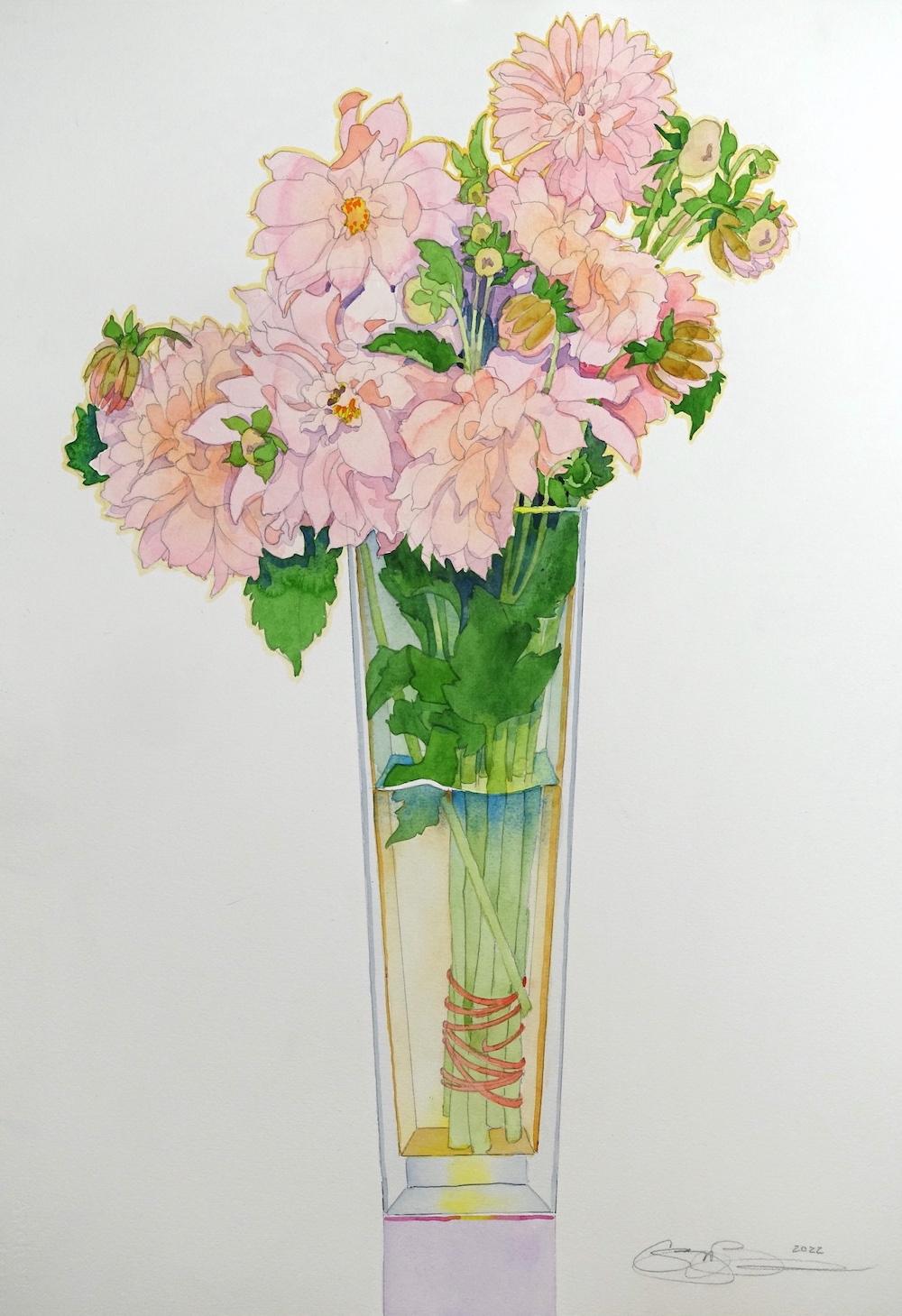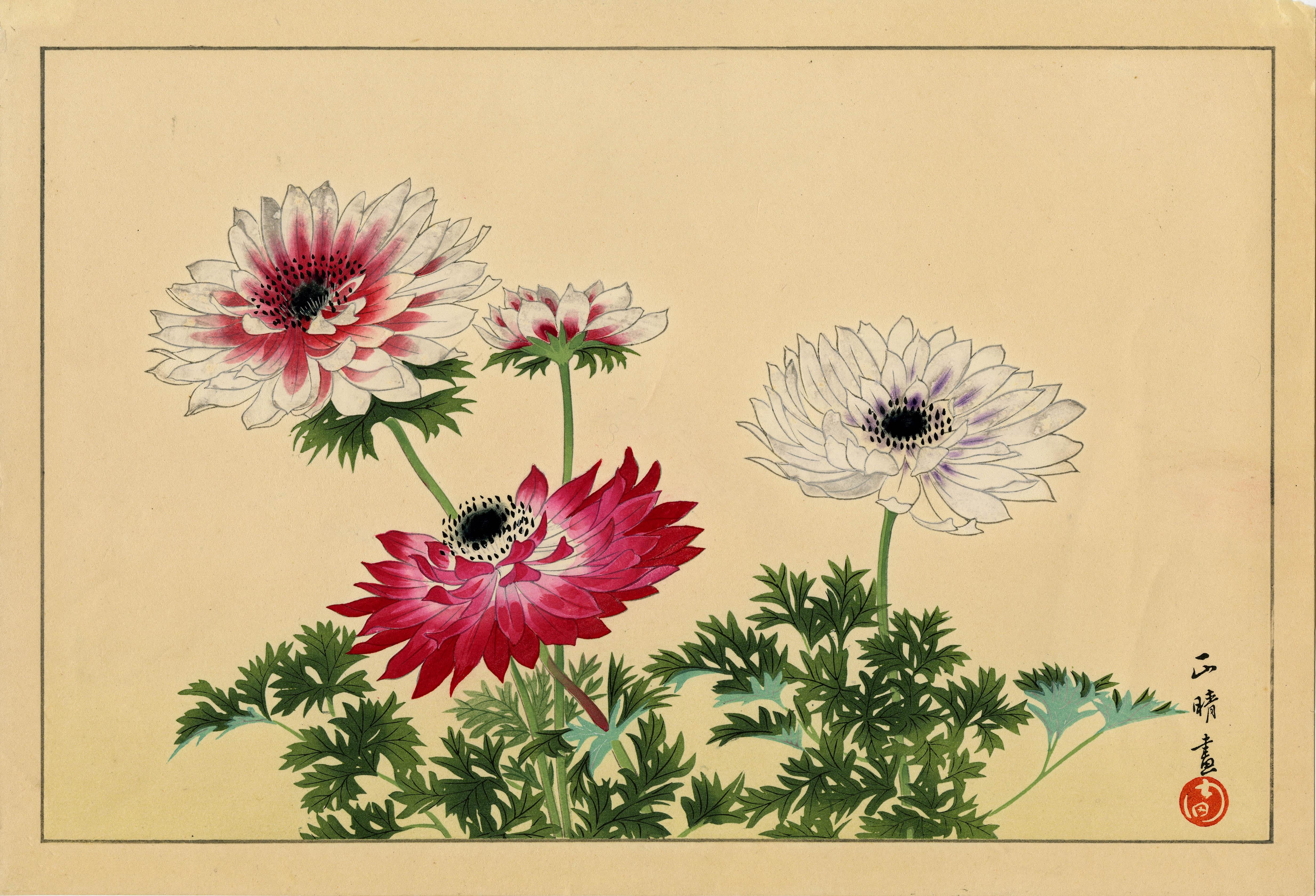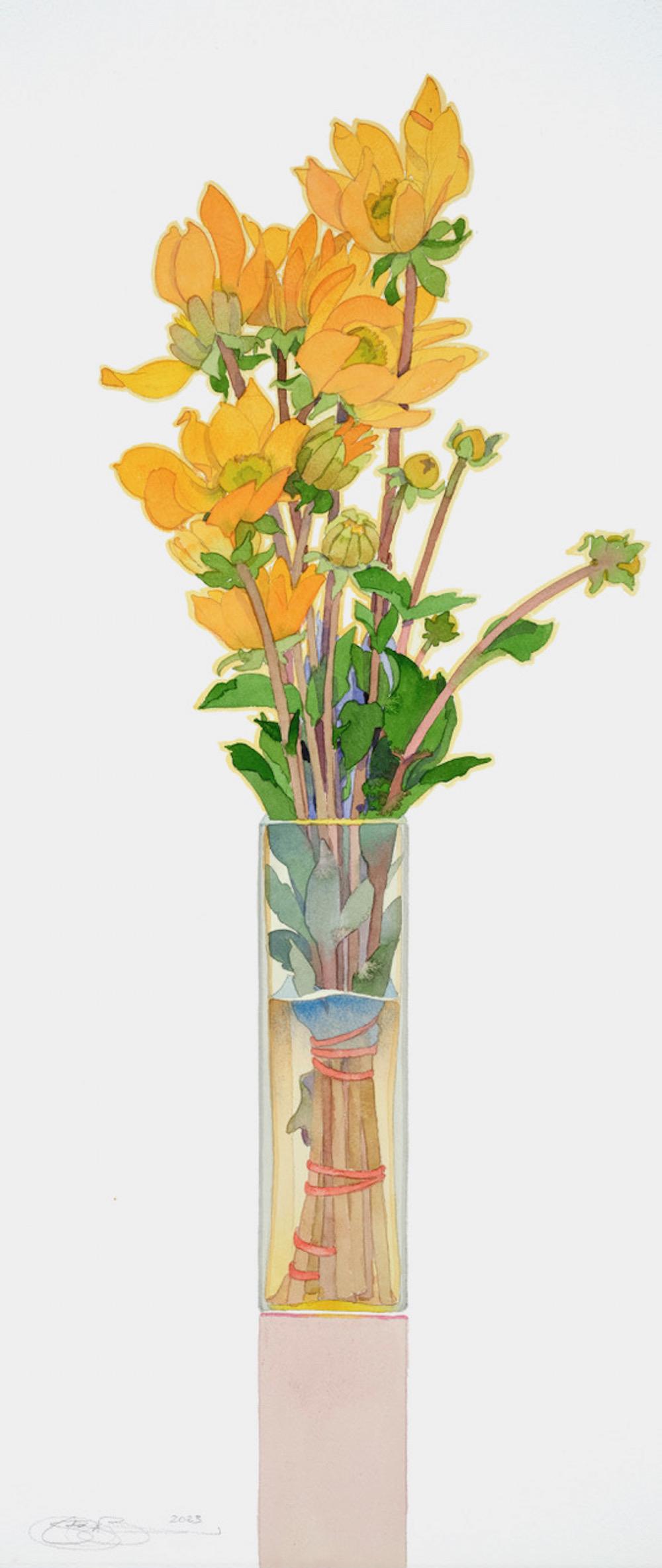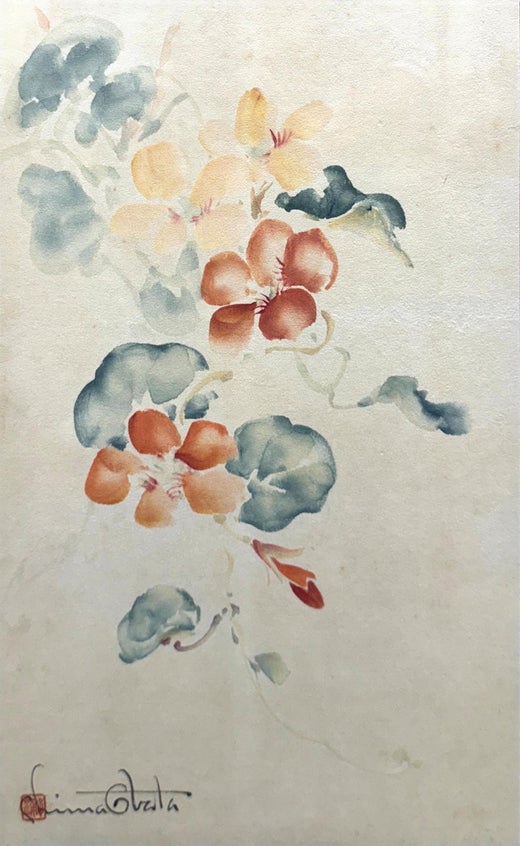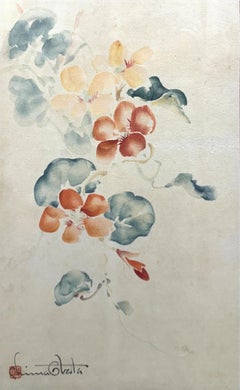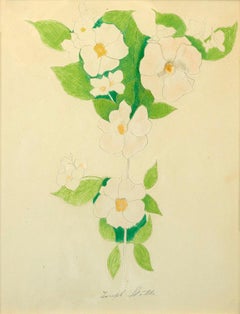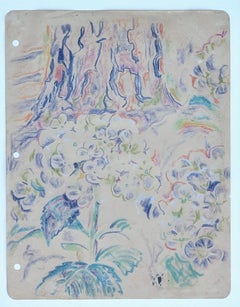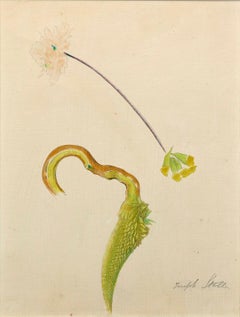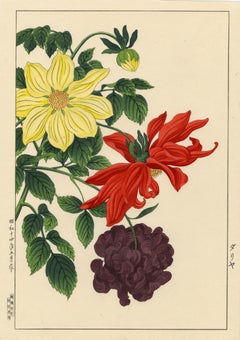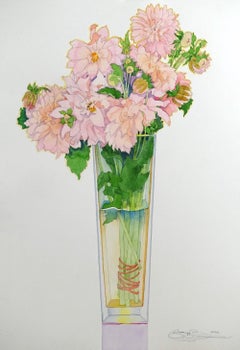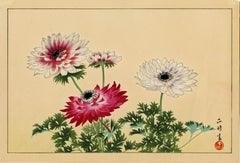Items Similar to "Dahlias" Chiura Obata, Japanese American, Red and Blue Delicate Floral Work
Want more images or videos?
Request additional images or videos from the seller
1 of 10
Chiura Obata"Dahlias" Chiura Obata, Japanese American, Red and Blue Delicate Floral Work1940
1940
$4,500
£3,435.73
€3,969.96
CA$6,317.15
A$7,041.12
CHF 3,694.23
MX$85,983.55
NOK 46,777.03
SEK 44,211.41
DKK 29,629.51
About the Item
Chiura Obata
Dahlias, 1940
Signed, dated and stamped lower right
Watercolor on paper
15 x 9 5/8 inches
Born in the Okayama prefecture of Japan, Chiura Obata was adopted by his uncle, an artist. As a child he was trained in ink painting, and at 14 he was apprenticed to the painter Murata Tanryo in Tokyo. He also studied with Kogyo Terasaki and Goho Hasimoto.
In 1903, Obata moved to San Francisco and began working as an illustrator for The New World and The Japanese American, two of the city's Japanese newspapers. He also did work as a commercial designer. Obata helped establish the East West Art Society in San Francisco in 1921, which sought to promote cross-cultural understanding through art. This goal was reflected in his embrace of the Nihonga style, which fused traditional Japanese sumi-e ink painting with the conventions of western naturalism.
He spent much of the 1920s painting landscapes throughout California, and among his favorite subjects were mountain landscapes. In 1927, he visited Yosemite and the Sierra Nevada, creating over a hundred paintings and sketches of the high country. Obata stayed in the USA until the death of his father in 1928.
Between 1928 and 1932, he worked in Tokyo as a painter and transformed his California landscape watercolors and sketches into a portfolio of 35 woodblock prints titled World Landscape Series - America, perhaps his most famous work. Obata's landscapes reveal his intensely personal and poetic vision of "Great Nature", a vision grounded in an underlying Zen philosophy of selflessness that accepts the insignificance of human affairs in relation to the timeless forces of nature.
In 1932 Obata Chiura returned to the U.S., and began work as an art instructor at the University of California, Berkeley.
In April, 1942, Obata Chiura and his wife Haruko were among the more than 100,000 Japanese Americans who were moved from their homes along the West coast into ten relocation camps. He was first sent to Tanforan. In September, 1942, he was moved to the Topaz, Utah, internment camp. During his internment in different camps, the artist made about hundred sketches and paintings until his release in 1945. The book, Topaz Moon, edited by his granddaughter Kimi Kodani Hill, is a documentation of his detention period and the works of art that he created during this time. While confined at Topaz, he organized and acted as Director for the Topaz Art School for the 8,000 Japanese Americans in the camp. The school had 16 artist instructors who taught 23 subjects to over 600 students. Obata's artwork from this time serves as a visual diary of the internees' daily life, and also as a powerful and lasting testament to the perseverance of the human spirit when confronted by prejudice.
In 1943, he was released from Topaz, and moved with his family to St. Louis, where he found work with a commercial art company. When the military exclusion ban was lifted in 1945, he was reinstated to his position at the University of California, where he stayed until his retirement in 1954. Obata was a popular professor, and played a pivotal role in introducing Japanese art techniques and aesthetics that became one of the distinctive characteristics of the California Watercolor School.
After his retirement he continued to paint, sketch and travel through the American countryside. In 1965 he received an order from the Japanese Emperor for promoting cultural exchange between the United States and Japan.
Chiura Obata died at the age of 90.
- Creator:Chiura Obata (1885 - 1975, Japanese)
- Creation Year:1940
- Dimensions:Height: 22.5 in (57.15 cm)Width: 16.5 in (41.91 cm)
- More Editions & Sizes:Unique workPrice: $4,500
- Medium:
- Movement & Style:
- Period:
- Condition:
- Gallery Location:New York, NY
- Reference Number:1stDibs: LU1841216217692
Chiura Obata
Chiura Obata ranks among the most significant California-based artists and Japanese American cultural leaders of the last century. Born in Okayama, Japan, Obata immigrated to San Francisco in 1903. By then, he was integrating Western practices into his art-making, and continued experimenting with new styles and methods throughout his seven-decade career. Today Obata is best known for majestic views of the American West, sketches based on hiking trips to capture what he called “Great Nature.” In 1903, Obata moved to San Francisco and began working as an illustrator for The New World and The Japanese American, two of the city's Japanese newspapers. He also did work as a commercial designer. Obata helped establish the East West Art Society in San Francisco in 1921, which sought to promote cross-cultural understanding through art. This goal was reflected in his embrace of the Nihonga style, which fused traditional Japanese sumi-e ink painting with the conventions of western naturalism. He spent much of the 1920s painting landscapes throughout California, and among his favorite subjects were mountain landscapes. In 1927, he visited Yosemite and the Sierra Nevada, creating over a hundred paintings and sketches of the high country. Obata stayed in the USA until the death of his father in 1928. In 1932 Obata Chiura returned to the U.S., and began work as an art instructor at the University of California, Berkeley. In April, 1942, Obata Chiura and his wife Haruko were among the more than 100,000 Japanese Americans who were moved from their homes along the West coast into ten relocation camps. He was first sent to Tanforan. In September, 1942, he was moved to the Topaz, Utah, internment camp. During his internment in different camps, the artist made about hundred sketches and paintings until his release in 1945. While confined at Topaz, he organized and acted as Director for the Topaz Art School for the 8,000 Japanese Americans in the camp. Obata's artwork from this time serves as a visual diary of the internees' daily life, and also as a powerful and lasting testament to the perseverance of the human spirit when confronted by prejudice. In 1943, he was released from Topaz, and moved with his family to St. Louis, where he found work with a commercial art company. When the military exclusion ban was lifted in 1945, he was reinstated to his position at the University of California, where he stayed until his retirement in 1954. Obata was a popular professor, and played a pivotal role in introducing Japanese art techniques and aesthetics that became one of the distinctive characteristics of the California Watercolor School. After his retirement he continued to paint, sketch and travel through the American countryside. In 1965 he received an order from the Japanese Emperor for promoting cultural exchange between the United States and Japan. A retrospective of his work was organized by the Smithsonian American Art Museum in 2019-2020.
About the Seller
5.0
Platinum Seller
Premium sellers with a 4.7+ rating and 24-hour response times
Established in 2022
1stDibs seller since 2022
115 sales on 1stDibs
Typical response time: <1 hour
- ShippingRetrieving quote...Shipping from: New York, NY
- Return Policy
Authenticity Guarantee
In the unlikely event there’s an issue with an item’s authenticity, contact us within 1 year for a full refund. DetailsMoney-Back Guarantee
If your item is not as described, is damaged in transit, or does not arrive, contact us within 7 days for a full refund. Details24-Hour Cancellation
You have a 24-hour grace period in which to reconsider your purchase, with no questions asked.Vetted Professional Sellers
Our world-class sellers must adhere to strict standards for service and quality, maintaining the integrity of our listings.Price-Match Guarantee
If you find that a seller listed the same item for a lower price elsewhere, we’ll match it.Trusted Global Delivery
Our best-in-class carrier network provides specialized shipping options worldwide, including custom delivery.More From This Seller
View All"Nasturtiums" Chiura Obata, Japanese American, Red and Blue Delicate Flowers
By Chiura Obata
Located in New York, NY
Chiura Obata
Nasturtiums, circa 1940
Signed and stamped lower left
Watercolor on paper
15 x 9 5/8 inches
Born in the Okayama prefecture of Japan, Chiura Obata was adopted by his uncle, an artist. As a child he was trained in ink painting, and at 14 he was apprenticed to the painter Murata Tanryo in Tokyo. He also studied with Kogyo Terasaki and Goho Hasimoto.
In 1903, Obata moved to San Francisco and began working as an illustrator for The New World and The Japanese American, two of the city's Japanese newspapers. He also did work as a commercial designer. Obata helped establish the East West Art Society in San Francisco in 1921, which sought to promote cross-cultural understanding through art. This goal was reflected in his embrace of the Nihonga style, which fused traditional Japanese sumi-e ink painting with the conventions of western naturalism.
He spent much of the 1920s painting landscapes throughout California, and among his favorite subjects were mountain landscapes. In 1927, he visited Yosemite and the Sierra Nevada, creating over a hundred paintings and sketches of the high country. Obata stayed in the USA until the death of his father in 1928.
Between 1928 and 1932, he worked in Tokyo as a painter and transformed his California landscape watercolors...
Category
1940s Modern Still-life Drawings and Watercolors
Materials
Paper, Watercolor
"Flowers" Joseph Stella, Vibrant Modernist Flower Composition on Paper
By Joseph Stella
Located in New York, NY
Joseph Stella
Flowers
Signed lower center
Crayon and pencil on paper
13 1/4 x 10 1/4 inches
Stella was born June 13, 1877 at Muro Lucano, Italy, a mountain village not far from Nap...
Category
Early 20th Century Modern Figurative Drawings and Watercolors
Materials
Paper, Crayon, Pencil
"Hydrangeas, " Walter Inglis Anderson, Mississippi Southern Illustrator, Flowers
Located in New York, NY
Walter Anderson ( American, 1903 - 1965)
Hydrangeas, circa 1950
Mixed media on paper
11 x 8 1/2 inches
Provenance:
Luise Ross Gallery, New York
Private Collection, New Jersey
Acquired from the estate of the above, 2021
Walter Anderson firmly believed that quality art was an important part of life and should be made available to everyone. As he said, "There should be simple, good decorations, to be sold at prices to rival the five-and-ten." Noticing that only poor quality art was available in stores and little was available for children, he resolved to make art which could be reproduced easily and sell inexpensively — linoleum block prints. This technique enabled him to provide affordable, quality art.
The technique of linoleum block printing is a simple concept; however, it requires much skill and talent to actually produce memorable art. Anderson purchased surplus "battleship linoleum," thicker than ordinary linoleum with a burlap backing for better support, to create his blocks. During the mid-1940s, he created almost 300 linocuts working in the attic of the sea-side plantation house, Oldfields, his wife's family home in Gautier. Masses of linoleum chips accumulated at the foot of the attic stairs as he often worked night and day. He began with sketching out a design directly on the linoleum. Once he had carved the image into the surface, he used the back of faded, surplus stock wallpaper that a friend sent him, laying long strips on top of the inked linoleum. A roller made of sewer pipe filled with sand served as his press. When the print was completed, he often colored it by hand with bold strokes and vivid colors. The prints were sold at Shearwater Pottery, the family business, for a mere dollar a foot.
But "what about a well-designed fairy tale for a child's room?" he asked himself. Since there was a lack of affordable art for children, much of his work with linoleum blocks focused on subjects for children. He depicted fables and fairy tales ranging from Arabian Nights, to Germany and the Grimm Brothers' Rapunzel, to the French story of The White Cat, to the Greek tales such as Europa and the Bull, and to tales from China, India, and other cultures. Anderson also created "mini" books featuring the alphabet and Robinson Cat. The blocks are not only alive with the story being depicted, but they are also filled with designs taken from Best-Maugard's Method for Creative Design. Swirls, half-circles and zig-zag lines fill every available space on the linoleum block making them come alive and capture their audience.
But fairy tales, children's verses and the "mini" books, consisting of about 90 blocks, were not the sole subject of Anderson's linoleum block prints. In total, he created approximately 300 linoleum blocks with subjects ranging from coastal flora and fauna, coastal animals, and sports and other coastal activities. Anderson even created linoleum blocks to be used to print tablecloths and clothing, some worn by his own children. Color and subjects of the linoleum block prints were not the only things that got them noticed.
In 1945 when Anderson was creating these prints, the standard size of linoleum block prints was only 12 by 18 inches. These small dimensions were due to the common size of the paper available and the restrictions made by national competitions. Since Anderson used wallpaper...
Category
Mid-20th Century American Modern Landscape Paintings
Materials
Paper, Crayon
"Tropical Flower with Azalea" Joseph Stella, circa 1919 Academic Azalea
By Joseph Stella
Located in New York, NY
Joseph Stella
Tropical Flower with Azalea, circa 1919
Signed lower right
Silverpoint and crayon on paper
Image 10 3/4 x 8 1/4 inches
Sheet 11 x 12 1/4 inches
Stella was born June 1...
Category
Early 20th Century Modern Figurative Drawings and Watercolors
Materials
Paper, Watercolor
"Flowers" Mary Abbott, Colorful Floral Still Life, Female Abstract Expressionism
By Mary Abbott
Located in New York, NY
Mary Abbott
Flowers, circa 1950
Signed lower left
Pastel on paper
30 x 22 1/4 inches
Provenance:
Aaron Galleries, Glenview, Illinois
Among the early exponents of Abstract Expressio...
Category
1950s Abstract Still-life Paintings
Materials
Paper, Pastel
"Cardinal Flowers Still Life, June" Walter Gay, Red and White Floral Bouquet
By Walter Gay
Located in New York, NY
Walter Gay (1856 - 1937)
Cardinal Flowers Still Life, June, 1875
Signed lower left; dated on the reverse
Oil on board
24 3/4 x 7 1/8 inches
Provenance:
Private Collection, Brunswick, Maine
Born in Hingham, Massachusetts, Walter Gay became a painter who specialized in interiors, particularly those of eighteenth-century French buildings. His style was traditional, and he ignored the influences of modernist paintings he saw while studying in Paris beginning 1876. He remained in Europe the rest of his life.
In his compositions, the rooms are nearly always devoid of human presence but suggest that someone has been there. Many of his interiors are museum settings, and although he was not an impressionist, his work often had atmospheric effects.
When Gay died in 1937, he was described in The New York Times as the "Dean of American Painters in France," where he and his Matilda moved in 1876. His first paintings there were genre subjects and realistic views of peasant life in Britanny, but he tired of these works, which he called "pot boilers."
In the 1890s, he began his signature interiors, mostly rooms in fashionable houses of the Gays and their friends. Reproductions of many of these paintings were published in 1920 by Albert Gallatin, also a painter. The Gays, with a retinue of about twenty servants, loved old houses, and lived in an eighteenth-century apartment on the Left Bank in Paris from January through April and beginning 1904, in a chateau in the countryside at le Breau, near Fontainebleau. There they had 300 acres of grounds to roam.
In 1907, they purchased this chateau which became quite a showplace and where they entertained extensively. However, during World War II, when Matilda was living there as a widow, German soldiers occupied the chateau, ruining much of the structure and plotting the destruction of the country the Gays loved...
Category
1870s American Impressionist Still-life Paintings
Materials
Oil, Board
$5,600 Sale Price
20% Off
You May Also Like
Dahlias
By Nishimura Hodo
Located in Fairlawn, OH
Dahlias
Color woodcut, 1939
Unsigned (as usual)
Format: oban
Publisher: Takemura Hideo
Stamp verso: "Made in Japan"
Provenance: Robert O. Muller
Biography
Hodo Nishimura...
Category
1930s Modern Still-life Prints
Materials
Woodcut
Pink Dahlias
By Gary Bukovnik
Located in Burlingame, CA
'Pink Dahlias' by master watercolorist Gary Bukovnik, who fuses sensual vitality with fluid yet powerful colorations to create floral images of great depth, intensity, and size.
In...
Category
21st Century and Contemporary Contemporary Still-life Drawings and Water...
Materials
Watercolor
Chrysanthemums
Located in Fairlawn, OH
Chrysanthemums
Color woodcut, c. 1950's
Signed lower right (see photo)
Publisher: Uchida (see photo of red seal)
Note: Chrysanthemums, a symbol of the sun, the Japanese consider the ...
Category
1950s Modern Still-life Prints
Materials
Woodcut
Chrysanthemums 1985. Paper, watercolor, 44x57 cm
Located in Riga, LV
Dzidra Bauma (1930)
Dzidra Bauma works in watercolor technique. She paint figural compositions, portraits, landscapes, flowers and still life. She is one of the most productive wate...
Category
1980s Impressionist Still-life Drawings and Watercolors
Materials
Paper, Watercolor
Thin Dahlias - unframed
By Gary Bukovnik
Located in Burlingame, CA
'Thin Dahlias' - unframed by master watercolorist Gary Bukovnik, who fuses sensual vitality with fluid yet powerful colorations to create floral images of great depth, intensity, and size.
Internationally exhibited and celebrated worldwide, Bukovnik’s iconic works express a spiritual exultation - a joie de vivre - a vivid celebration of beauty. The painting captures the season of nature’s rebirth when the world awakes from its winter repose — Forever Spring...
Category
21st Century and Contemporary Contemporary Still-life Drawings and Water...
Materials
Paper, Watercolor
Winifred Barkaway (1915-2010) - 1946 Watercolour, Chrysanthemums and Porcelain
Located in Corsham, GB
A delightful depiction of colourful chrysanthemums placed in a shallow porcelain vase. Signed and dated to the lower right. Presented in a wooden frame. On paper.
Category
Mid-20th Century Still-life Drawings and Watercolors
Materials
Watercolor
$268 Sale Price
20% Off
More Ways To Browse
Japanese American Artist
American Woodblock
American Red Cross
Japanese Sumi
Japan Moon Painting
Japanese Zen Painting
Nature Woodblock
Utah Mountains
Dahlia Painting
Topaz Painting
Sumi E
Sierra Nevada Painting
Watercolor Utah
Spirit Of St Louis
Topaz Cross
Woodblock Moon
Vintage Dahlia Print
Painting Europe Landscape
